15 items found
European portfolio for pre-primary educators. The plurilingual and intercultural dimension
|
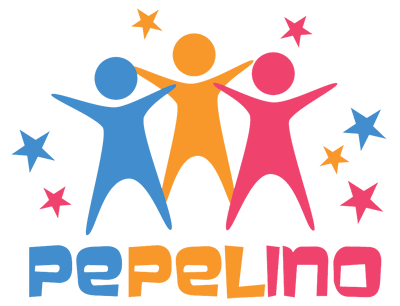
|
This portfolio is designed for educators and teachers in the pre-primary sector, either in initial or in-service training. It encourages personal reflection on the professional skills related to the linguistic and intercultural dimension of working with children.
Available in English and French
Go to the publication page |
501
European portfolio for pre-primary educators. The plurilingual and intercultural dimension
This portfolio is designed for educators and teachers in the pre-primary sector, either in initial or in-service training. It encourages personal reflection on the professional skills related to the linguistic and intercultural dimension of working with children.
Available in English and French
Go to the publication page
7
//www.ecml.at/Portals/1/mtp4/preelementaire/images/pepelino-logo.gif
//www.ecml.at/ECML-Programme/Programme2012-2015/Pepelino/tabid/1833/language/en-GB/Default.aspx
7
TrainEd – Training teacher educators
|

|
This book and CD-Rom have been produced as a practical guide for those who are beginners in the field of teacher education – though experienced teacher trainers may find it interesting and useful, too.
Available in English, French and Hungarian.
Go to the publication page |
34
TrainEd – Training teacher educators
This book and CD-Rom have been produced as a practical guide for those who are beginners in the field of teacher education – though experienced teacher trainers may find it interesting and useful, too.
Available in English, French and Hungarian.
Go to the publication page
5
//www.ecml.at/Portals/1/ECML.Publications.Files/2e393ab7-8a27-43e7-af70-01e9fcba1537.jpg
//www.ecml.at/Resources/ECMLPublications/tabid/277/PublicationID/12/language/en-EN/Default.aspx
7
QualiTraining – A training guide for quality assurance in language education
|

|
There is growing interest in national and regional contexts for standard-setting in areas such as evaluation, approaches to quality control and management. In the first medium term programme the ECML project "Quality Assurance and Self-assessment for Schools and Teachers" developed a CD-Rom entitled "Quality Management in Language Education".
Available in English and German.
Go to the publication page |
35
QualiTraining – A training guide for quality assurance in language education
There is growing interest in national and regional contexts for standard-setting in areas such as evaluation, approaches to quality control and management. In the first medium term programme the ECML project "Quality Assurance and Self-assessment for Schools and Teachers" developed a CD-Rom entitled "Quality Management in Language Education".
Available in English and German.
Go to the publication page
5
//www.ecml.at/Portals/1/ECML.Publications.Files/895a44c2-b76c-4b8e-a786-29b789c8c514.jpg
//www.ecml.at/Resources/ECMLPublications/tabid/277/PublicationID/17/language/en-EN/Default.aspx
7
EPOSTL – European Portfolio for Student Teachers of Languages - A reflection tool for language teacher education
|

|
The European Portfolio for Student Teachers of Languages (EPOSTL) is a document intended for students undergoing their initial teacher education which encourages them to reflect on the didactic knowledge and skills necessary to teach languages, helps them to assess their own didactic competences and enables them to monitor their progress and to record their experiences of teaching during the course of their teacher education.
Available in 14 languages.
Go to the publication page
|
31
EPOSTL – European Portfolio for Student Teachers of Languages - A reflection tool for language teacher education
The European Portfolio for Student Teachers of Languages (EPOSTL) is a document intended for students undergoing their initial teacher education which encourages them to reflect on the didactic knowledge and skills necessary to teach languages, helps them to assess their own didactic competences and enables them to monitor their progress and to record their experiences of teaching during the course of their teacher education.
Available in 14 languages.
Go to the publication page
3
//www.ecml.at/Portals/1/ECML.Publications.Files/be78d2cb-bb53-49e7-a2be-adec85083919.jpg
7
Mediating between theory and practice in the context of different learning cultures and languages
|

|
In the last few years a wide variety of methods and approaches to teaching and learning foreign languages has been proposed by methodologists and applied linguists.from views of the nature of language and resulting descriptive models; from theories of and research into second-language acquisition; from views of how teachers can facilitate learning processes -i.e.methodology. Download the publication |
264
Mediating between theory and practice in the context of different learning cultures and languages
In the last few years a wide variety of methods and approaches to teaching and learning foreign languages has been proposed by methodologists and applied linguists.from views of the nature of language and resulting descriptive models; from theories of and research into second-language acquisition; from views of how teachers can facilitate learning processes -i.e.methodology.
Download the publication
1
//www.ecml.at/Portals/1/ECML.Publications.Files/592ad40a-6a83-4470-be4c-5033e9aed122.jpg
7
EPOSTL – Using the European Portfolio for Student Teachers of Languages
|

|
The European Portfolio for Student Teachers of Languages is a tool for reflection and self-assessment of the didactic knowledge and skills necessary to teach languages. It builds on insights from the Common European Framework of Reference and the European Language Portfolio as well as the European Profile for Language Teacher Education. Four years after its initial publication it has been translated into twelve European and Asian languages.To meet widespread demand this ECML publication provides materials which support its implementation in teacher education.
Available in English.
Go to the publication page |
201
EPOSTL – Using the European Portfolio for Student Teachers of Languages
The European Portfolio for Student Teachers of Languages is a tool for reflection and self-assessment of the didactic knowledge and skills necessary to teach languages. It builds on insights from the Common European Framework of Reference and the European Language Portfolio as well as the European Profile for Language Teacher Education. Four years after its initial publication it has been translated into twelve European and Asian languages.To meet widespread demand this ECML publication provides materials which support its implementation in teacher education.
Available in English.
Go to the publication page
0
//www.ecml.at/Portals/1/ECML.Publications.Files/816efa55-91d0-47b5-81e3-d03074434bdf.jpg
7
Facing the future - Language educators across Europe
|
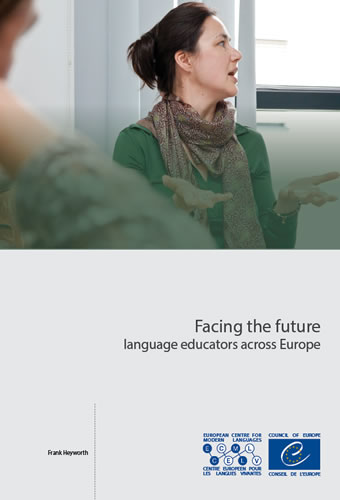
|
Will teachers continue broadly to do what they have always done? - in which case future needs will be organisational and logistic, making better provision within existing parameters. Or will the nature of the job of language educators change so that a new paradigm for the profession will be required? If so, what new elements will affect their work?
Go to the publication page |
1553
Facing the future - Language educators across Europe
Will teachers continue broadly to do what they have always done? - in which case future needs will be organisational and logistic, making better provision within existing parameters. Or will the nature of the job of language educators change so that a new paradigm for the profession will be required? If so, what new elements will affect their work?
Go to the publication page
0
//www.ecml.at/Portals/1/images/covers/Facing-the-future-language-educators-across-Europe.jpg
//www.ecml.at/Resources/ECMLPublications/tabid/277/ID/60/language/en-GB/Default.aspx
7
CoCoCop – Coherence of principles, cohesion of competences: exploring theories and designing materials for teacher education
|
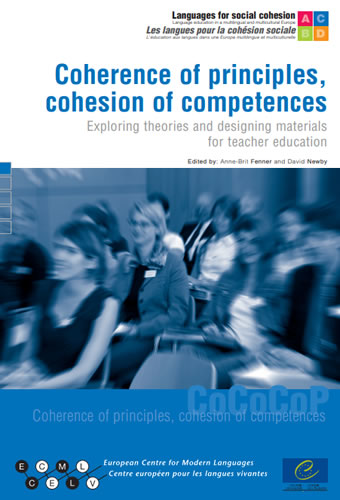
|
The multi-competence nature of post-communicative language teaching has been spawned by a variety of theories deriving from very diverse sources. It was the aim of this project to investigate learning and teaching to discover whether some coherence between theoretical aspects of these different sources could be found and to what extent the apparently disparate competences, which are the aims of modern language teaching, could be seen as a cohesive whole. In order to do so, the project took as its starting point the role and nature of teacher education as a basis to explore theories which underlie post-communicative language learning and teaching. Following a survey of teacher education institutions, the question was addressed as to how communicative language competence can act as a springboard to other competences which lie within areas such as social interaction, language awareness, intercultural awareness and learner autonomy. Focusing on three main areas - learner autonomy, intercultural awareness, including literature teaching and human rights teaching, plus grammar - the first part of the publication considers theoretical aspects of these areas and attempts to show links between them. In the second part of the publication, case studies are presented illustrating the implementation of principles identified in the first part, both in language and in teacher education. Go to the publication |
1554
CoCoCop – Coherence of principles, cohesion of competences: exploring theories and designing materials for teacher education
The multi-competence nature of post-communicative language teaching has been spawned by a variety of theories deriving from very diverse sources. It was the aim of this project to investigate learning and teaching to discover whether some coherence between theoretical aspects of these different sources could be found and to what extent the apparently disparate competences, which are the aims of modern language teaching, could be seen as a cohesive whole. In order to do so, the project took as its starting point the role and nature of teacher education as a basis to explore theories which underlie post-communicative language learning and teaching. Following a survey of teacher education institutions, the question was addressed as to how communicative language competence can act as a springboard to other competences which lie within areas such as social interaction, language awareness, intercultural awareness and learner autonomy. Focusing on three main areas - learner autonomy, intercultural awareness, including literature teaching and human rights teaching, plus grammar - the first part of the publication considers theoretical aspects of these areas and attempts to show links between them. In the second part of the publication, case studies are presented illustrating the implementation of principles identified in the first part, both in language and in teacher education.
Go to the publication
0
//www.ecml.at/Portals/1/images/covers/Coherence-of-principles-cohesion-of-competences.jpg
//www.ecml.at/Resources/ECMLPublications/tabid/277/ID/53/language/en-GB/Default.aspx
7
GroupLead – Group facilitation in language teacher education
|
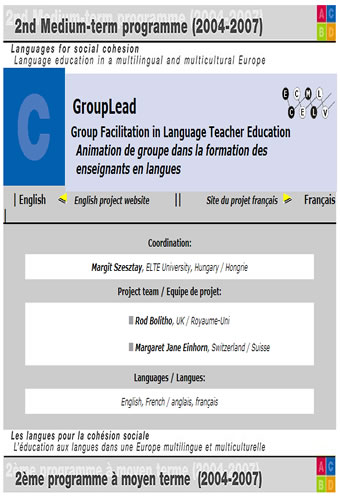
|
The aim of this publication is to provide you with an introduction to what working with groups in a facilitative mode involves. As facilitation is closely bound up with attitudes and personal qualities, you cannot learn to become a facilitator just by going through the material provided here. What we set out to do is to give you an overview of what we see as the main issues related to facilitation, to provide you with plenty of food for thought, guidelines for observation, triggers for self-reflection, and some practical tools which you can adapt and try out in your own practice. Go to the publication |
1555
GroupLead – Group facilitation in language teacher education
The aim of this publication is to provide you with an introduction to what working with groups in a facilitative mode involves. As facilitation is closely bound up with attitudes and personal qualities, you cannot learn to become a facilitator just by going through the material provided here. What we set out to do is to give you an overview of what we see as the main issues related to facilitation, to provide you with plenty of food for thought, guidelines for observation, triggers for self-reflection, and some practical tools which you can adapt and try out in your own practice.
Go to the publication
0
//www.ecml.at/Portals/1/images/covers/GroupLead.jpg
//www.ecml.at/Resources/ECMLPublications/tabid/277/ID/46/language/en-GB/Default.aspx
7
Frank Heyworth, How an ECML publication can make a difference - case study on the European Portfolio for Student Teachers of Languages |
Available in English.
Download the report |
1560
Frank Heyworth, How an ECML publication can make a difference - case study on the European Portfolio for Student Teachers of Languages
Available in English.
Download the report
0
//www.ecml.at/Portals/1/resources/Articles and publications on the ECML/EPOSTL_impact_Heyworth.pdf
7
Collection of case studies on examples of good practice in teacher education
|
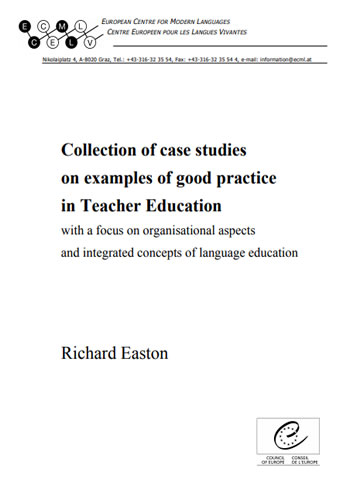
|
This collection of case studies aims to present some relevant information about developments in language teacher education across a number of geographically distinct sites and across a range of sectors. The main areas discussed are lifelong learning, learner autonomy, the use of information and communication technologies, plurilingualism and partnership in many of its various guises.
Available in English
Go to the publication page |
1723
Collection of case studies on examples of good practice in teacher education
This collection of case studies aims to present some relevant information about developments in language teacher education across a number of geographically distinct sites and across a range of sectors. The main areas discussed are lifelong learning, learner autonomy, the use of information and communication technologies, plurilingualism and partnership in many of its various guises.
Available in English
Go to the publication page
0
https://www.ecml.at/Portals/1/images/covers/Collection-of-case-studies-on-examples-of-good-practice-in-Teacher-Education.jpg?ver=2018-04-17-152959-713
7
LCaS – Teacher training modules on the use of case studies in language teaching at secondary and university level - A handbook
|
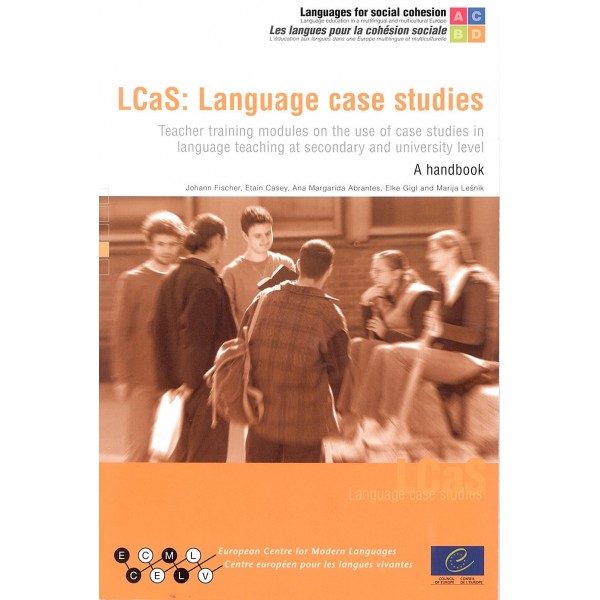
|
Due to the recent increase in trade, travel and political and social co-operation, language competence has become a key skill in modern Europe. Great efforts have been made to improve language training at all education levels. Whereas in the past language teaching was mainly related to cultural themes with an emphasis on literature, communicative aspects in everyday international contact situations, both for personal and for professional reasons, have become more and more important and language teaching has become interwoven with subject teaching. Case studies have proven to be an excellent means for the integration of subject-specific aspects into language teaching.
Available in English
Go to the publication page
|
1730
LCaS – Teacher training modules on the use of case studies in language teaching at secondary and university level - A handbook
Due to the recent increase in trade, travel and political and social co-operation, language competence has become a key skill in modern Europe. Great efforts have been made to improve language training at all education levels. Whereas in the past language teaching was mainly related to cultural themes with an emphasis on literature, communicative aspects in everyday international contact situations, both for personal and for professional reasons, have become more and more important and language teaching has become interwoven with subject teaching. Case studies have proven to be an excellent means for the integration of subject-specific aspects into language teaching.
Available in English
Go to the publication page
0
https://www.ecml.at/LinkClick.aspx?fileticket=CJwCBWBYuyQ%3d&portalid=1&language=en-GB
7
The status of language educators
|
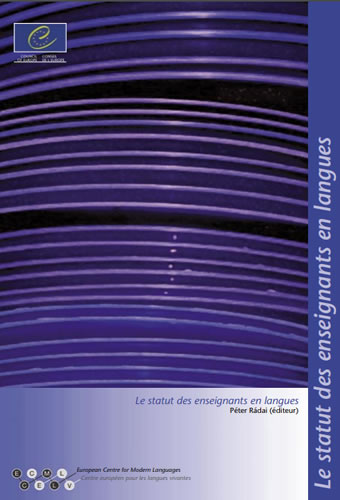
|
How respected do you feel in the staff-room? Do parents consider the job you do a worthwhile one? How often do decision-makers ask you concerning your views about language education? Is language education regarded as a profession or a kind of generous service? We have learnt from the responses of dozens of our fellow professionals to the questions above that there is something fundamentally wrong with the prestige of language education and its practitioners. A small but enthusiastic group has heeded the call, hence this book.
Available in English and French
Go to the publication page
|
1731
The status of language educators
How respected do you feel in the staff-room? Do parents consider the job you do a worthwhile one? How often do decision-makers ask you concerning your views about language education? Is language education regarded as a profession or a kind of generous service? We have learnt from the responses of dozens of our fellow professionals to the questions above that there is something fundamentally wrong with the prestige of language education and its practitioners. A small but enthusiastic group has heeded the call, hence this book.
Available in English and French
Go to the publication page
0
https://www.ecml.at/Portals/1/images/covers/Le-statut-des-enseignants-en-langues.jpg?ver=2018-04-17-120144-830
7
Towards a socio-interactional approach to foster autonomy in language learners and users
|
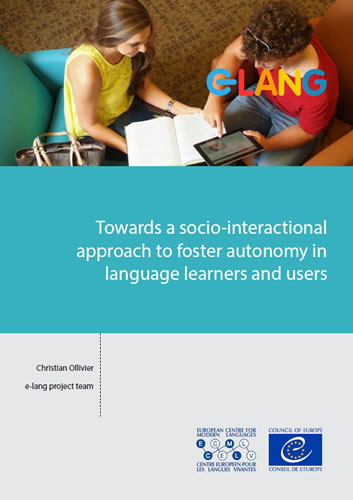
|
This book has been produced as part of the e-lang project “Digital literacy for the teaching and learning of languages” (project of the European Centre for Modern Languages within its “Languages at the heart of learning” programme 2016-2019). It is intended for language teachers and future language teachers, as well as researchers interested in this topic who wish to explore the pedagogical principles of the e-lang project.
Available in English and French
Go to the publication page
|
1732
Towards a socio-interactional approach to foster autonomy in language learners and users
This book has been produced as part of the e-lang project “Digital literacy for the teaching and learning of languages” (project of the European Centre for Modern Languages within its “Languages at the heart of learning” programme 2016-2019). It is intended for language teachers and future language teachers, as well as researchers interested in this topic who wish to explore the pedagogical principles of the e-lang project.
Available in English and French
Go to the publication page
0
https://www.ecml.at/Portals/1/images/covers/cover-elang.jpg?ver=2018-11-28-105233-590
7
Frank Heyworth - How an ECML publication can make a difference – case study on the European Portfolio for Student Teachers of Languages
|

|
Aailable online
Download |
1558
Frank Heyworth - How an ECML publication can make a difference – case study on the European Portfolio for Student Teachers of Languages
Aailable online
Download
//govboard.ecml.at/Promotionimpact/tabid/1631/language/en-EN/Default.aspx
7